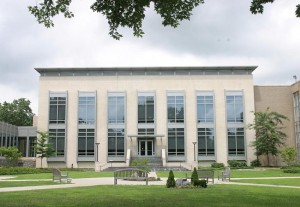Law school isn”™t the draw it once was.
 The number of people taking the Law School Admission Test, or LSAT, is down 25 percent over the past two years and 16 percent in the 2011-12 academic year. Experts attribute the decline to the weak job market for lawyers and the large debt that law students typically incur to pay for their education.
The number of people taking the Law School Admission Test, or LSAT, is down 25 percent over the past two years and 16 percent in the 2011-12 academic year. Experts attribute the decline to the weak job market for lawyers and the large debt that law students typically incur to pay for their education.
At Pace University Law School in White Plains, where applications for this fall”™s entering class are still being accepted, full-time enrollment fell more than 10 percent from fall 2010 to fall 2011, from 236 to 210 students. Part-time enrollment dropped from 34 students in 2010 to 20 students in 2011. Applications also fell from 3,082 in 2010 to 2,812 in 2011, a drop of 9 percent.
For those who are still choosing law as a career, what are they choosing to study?
At Pace, officials point to three areas: environmental law, international law and intellectual property law.
“Environmental law is popular now,” said David Cassuto, a professor who teaches in that area. “The reasons are tied to the state of the world climate, where climate change is an increasing concern. Many firms have climate change practices. It will have a significant impact on the legal landscape. For instance, if carbon emissions cause the climate temperature to rise and that causes damage to someone”™s beachfront property, is the emitter liable?”
Cassuto said there is a great deal of current litigation over the issue of emissions control and noted the number of cases pending before the Supreme Court that deal with climate change.
One issue currently in litigation is the extent of the authority of the federal Environmental Protection Agency to regulate carbon emissions. “A 2008 case, Massachusetts vs. EPA, gave it the authority. The question now is, how much?” said Cassuto.
Cassuto also teaches water allocation law. “There”™s a shortage of water in the West and increasing shortages in the East. The amount of water hasn”™t changed, but the number of people using it has,” he said. He singled out the Colorado River as the source of much litigation in recent years.
There is also the issue of rights to various bodies of water. “The Great Lakes cross a boundary between the US and Canada. There is the issue of regulating access to them. Who has the right to this water?” Cassuto said.
In another area of environmental law, Cassuto teaches animal rights law. “There are environmental and sociological implications,” he said. “Why can we treat other species the way we do? And what about the way they”™re used in industry?”
Environmental law is a specialty at Pace, which has had its program for 30 years. It has been rated the third-best environmental program in the U.S. for nearly 20 years.
“Climate change is certainly an area for jobs,” said Cassuto. “We offer an L.L.M, (master”™s in law) with a specialization in climate change. It”™s hard to get a job regardless of your specialization, but I believe environmental law will emerge stronger from this downturn.”
Karl Coplan, who also teaches environmental law and is the co-director of the Pace Environmental Litigation Clinic, said employment in that area increases whenever there is a new regulatory program. “Then agencies have to gear up to enforce regulations, and they need lawyers,” he said.
Coplan is also the principal outside counsel for Riverkeeper Inc. “As New York state moves toward permitting hydrofracking, we”™re fighting them on that,” he said of his work for the regional environmental advocacy group.
Students take part in cases such as that through the environmental litigation clinic, where 10 students each semester are allowed to appear in court and act as lawyers, supervised by Coplan and his colleagues, Robert Kennedy Jr. and Dan Estrin. “The students get great experience and Riverkeeper gets excellent representation,” he said.
International law is also proving attractive to students. Some of that attraction has to do with the bleak job market in the U.S. “People want to make a living,” said Matthew Brotmann, the head of the international law program at Pace Law School.
Brotmann said there has been a shift in focus for students interested in international law, especially over the last two years. Students traditionally had been interested in working for international tribunals and nongovernmental organizations, such as Human Rights Watch and Amnesty International. “But now,” he said, “they are interested in working for international corporations,” where salaries are higher. “The misconception is that they have to go overseas to work. They don”™t. These corporations are right here in Westchester.”
For those who do choose to stay on the public side of international law, Brotmann says more attention is being drawn to international crimes, crimes against humanity and war crimes. “This is drawing students,” he said. “To meet this demand, we have additional offerings at the law school,” such as the course he teaches on prosecution of war crimes. “We also have enhanced offerings on human rights law and have created a number of experiential learning opportunities. We have students at major international law tribunals, students in the Hague and Cambodia.”
Intellectual property law is another expanding area of interest.
“Ten years ago, there were two courses,” said Pace Law School spokeswoman Joan Gaylord. “Now this is a major area of interest to the post-Napster generation.” She was referring to the Internet service that emphasized sharing audio files, typically music, and ran into legal difficulties over copyright infringement.
















